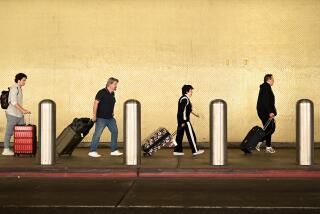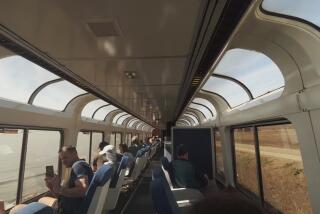Executive Travel : Naps, Wake-Up Calls and Other Tips for Better Sleep on the Road
- Share via
If you never have trouble sleeping at home but find it hard to get to sleep on the road, you’re not alone.
A recent study sponsored by the National Sleep Foundation and Hilton Hotels shows that nearly half of all business travelers have trouble sleeping. The majority of those (71%) cited waking up in the middle of the night as the most common sleep disturbance. Having trouble falling asleep bothered 62%.
Travel insomnia is one of those facts of life that many people accept, but until recently there hasn’t been much research focused specifically on sleep dysfunction in frequent travelers. Now the National Sleep Foundation, hotels and airlines are funding studies to gather data on the habits of such people and find ways to help them sleep better.
“If you’re tired when you’re on a business trip, it almost negates the purpose of the trip,” said Thomas Roth, director of the Sleep Disorders and Research Institute at Henry Ford Hospital in Detroit. “It impairs alertness, critical thinking, memory and judgment, not to mention increases the risk of falling asleep at the wheel.”
People often feel trapped when they are sleep-deprived, he said. They realize they need to catch up on their sleep, but they can’t do it.
The biggest misconception business travelers have about sleep is that they can train themselves to not need much of it, he said. You can’t change your basic sleep requirements any more than you can will yourself to fall asleep.
That’s something many experienced business travelers have resigned themselves to. Rose Piper LaCroix, a Los Angeles-based consultant for the behavioral health industry, logs about 270,000 miles a year, more than many flight attendants. “I can function on three hours of sleep,” she said. “But not well.”
Indeed, people have been known to try all kinds of strange remedies for insomnia and jet lag. Gimmicks ranging from watches that run slower on westbound trips (and faster on eastbound ones) to special jet lag diets all have their enthusiasts. Some travelers even consult special software on their portable computers for advice on when to sleep, when to get light and when to eat, all in an effort to trick their bodies out of fatigue.
None of that has equaled the recent surge of interest in melatonin, a synthetic version of a naturally occurring hormone the body produces as sleep begins. Melatonin, widely available at health and other stores, has been hyped as a wonder drug for travel-related sleep problems. It is supposedly helpful in signaling the body to go to sleep.
*
Sleep experts, however, are reluctant to encourage the widespread use of melatonin until more research results are available.
“What we know about it is not a lot,” said Joan Goldberg, spokeswoman for the National Sleep Foundation in Washington. “There’s a fair amount of research regarding the use of melatonin to help shift workers in adjusting their biological clocks. However, some research also shows it may affect the heart, and it may affect fertility.” The foundation doesn’t recommend its use for travel-related insomnia, she said.
There are, however, some tricks that have been both time- and road-tested for improving sleep on trips.
For example, according to the Hilton survey, stress is the No. 1 disrupter of sleep among business travelers. It follows, then, that finding ways to reduce stress will improve sleep.
“One of the most common forms of travel-related stress is what we call the ‘first-night effect,’ ” Roth said, which stems from trying to sleep in an unfamiliar environment.
Roth recommends that travelers unpack as soon as they arrive. Bringing a few familiar items, such as a family picture, favorite pillow or a coffee mug, can make the room feel more homelike.
Not everyone wants things the way they are at home, however. LaCroix, for example, finds it relaxing to be able to strew things about the room in a way she never would at home. She does carry a family picture to place in the midst of it all, however. “It’s a reminder of why you’re doing it,” she said.
She also used to travel with a small vase and would stop to get a flower for her room in each new location. The flower gave each room a sense of familiarity, she said.
Making a room comfortable sets the stage for sleep, but most travelers need additional strategies to actually cross the threshold into Dreamland.
It helps, for example, to anticipate time zone changes in advance by getting up and going to bed a little earlier, starting a few days before an eastbound trip. (Go to bed and get up a few hours later for a westbound trip, although since that adjustment is usually easier for most people, it isn’t as important.)
*
Many travelers also try to arrive at their destinations in the evening in advance of any meetings in order to give themselves a chance to adjust. Sleep experts advise trying to stay up until a reasonable local bedtime, say 10 p.m., to maximize the chance of getting a regular night of rest.
If that’s not possible, another tactic frequent travelers use is to set their watches to the local time as soon as they board the plane, then try to match their schedule of meals, meetings and bedtime to the new zone as closely as possible.
And if you’ve already lost some sleep, naps can help.
“The key for me to making traveling palatable and bearable is to try to sleep on the plane,” LaCroix said. “When you travel as much as I have, you can literally fall asleep anywhere.”
LaCroix takes catnaps of up to 20 minutes, which is something sleep experts recommend. Napping longer than two hours can make it more difficult to fall asleep at night, Roth said. A few accessories, such as earplugs and a sleep mask, can help drown out distracting noise and light.
Many business travelers also find that paying attention to what they eat and drink can make a difference in the quality of their sleep.
“I’m a compulsive Perrier drinker,” LaCroix said.
Indeed, drinking plenty of water to counter the effects of dehydration caused by plane air, and avoiding both alcohol and caffeine, substances that impair the body’s sleep mechanisms, can help, Roth said. People should also avoid eating heavy meals before sleeping since the digestion process revs the body up at a time when it should be winding down, he said. Similarly, light exercise is helpful for relaxing, but vigorous exercise right before sleep is counterproductive.
If sleep difficulty is a common problem for someone on the road, it’s also worth checking with a physician about the short-term use of medication, Goldberg said.
And travelers who have persistent insomnia that continues when they get back home should get a medical checkup to rule out underlying problems.
“Insomnia is a symptom,” Goldberg said. It can be the result of anything from underlying depression or grief to simple stress.
*
Despite what is known about sleep, many people still swear by their own tricks to help them gauge their alertness or help them fall asleep in strange places.
Charles Wolf, director of economic research at Rand Corp.’s National Defense Research Institute, swears by a system of meticulously keeping track of his sleep deficit. Wolf, who has logged about a million miles in 15 years, many of them on trips to Asia and Europe, programs his pocket calculator to figure out his actual sleep deficit at any point on his trip. He uses the knowledge to help him figure out the amount of sleep he needs.
“In my own case, if I can keep this cumulative deficit within about 15% of the quota of sleep I am normally accustomed to, the symptoms of jet lag do not arise,” he said.
For LaCroix, the trick is in her alarm system.
“Never trust the alarm clock,” she said. “Always arrange a wake-up call.” LaCroix requests hers 15 minutes before she really needs to wake up, then she sets the alarm for her actual wake-up time. The system seems to guarantee she won’t sleep fitfully, worrying about whether she’ll wake up on time.
And even sleep experts have their quirks. Roth, for example, never sets his watch to the local time, contrary to what he and other sleep experts recommend for others.
“It’s my own mini-mental-status exam,” he said. “I figure if I can’t figure out the local time, I shouldn’t be up and walking around.”
Carol Smith is a freelance writer based in Pasadena. Readers with questions or comments about Executive Travel can write to Executive Travel, Business Section, Los Angeles Times, Times Mirror Square, Los Angeles, CA 90053 or send an electronic message to business@news.latimes.com on the Internet.
More to Read
Sign up for The Wild
We’ll help you find the best places to hike, bike and run, as well as the perfect silent spots for meditation and yoga.
You may occasionally receive promotional content from the Los Angeles Times.






